大学英语综合教程课文原文翻译对照
大学英语综合教程课文翻译
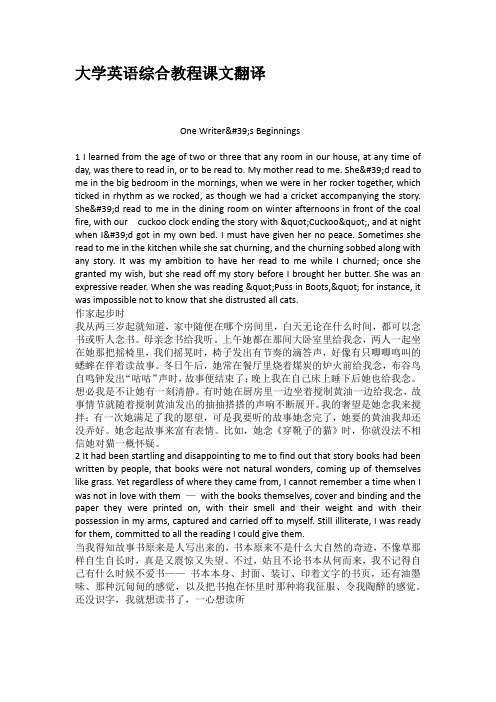
大学英语综合教程课文翻译One Writer's Beginnings1 I learned from the age of two or three that any room in our house, at any time of day, was there to read in, or to be read to. My mother read to me. She'd read to me in the big bedroom in the mornings, when we were in her rocker together, which ticked in rhythm as we rocked, as though we had a cricket accompanying the story. She'd read to me in the dining room on winter afternoons in front of the coal fire, with our cuckoo clock ending the story with "Cuckoo", and at night when I'd got in my own bed. I must have given her no peace. Sometimes she read to me in the kitchen while she sat churning, and the churning sobbed along with any story. It was my ambition to have her read to me while I churned; once she granted my wish, but she read off my story before I brought her butter. She was an expressive reader. When she was reading "Puss in Boots," for instance, it was impossible not to know that she distrusted all cats.作家起步时我从两三岁起就知道,家中随便在哪个房间里,白天无论在什么时间,都可以念书或听人念书。
全新版大学英语综合教程3课文原文及翻译
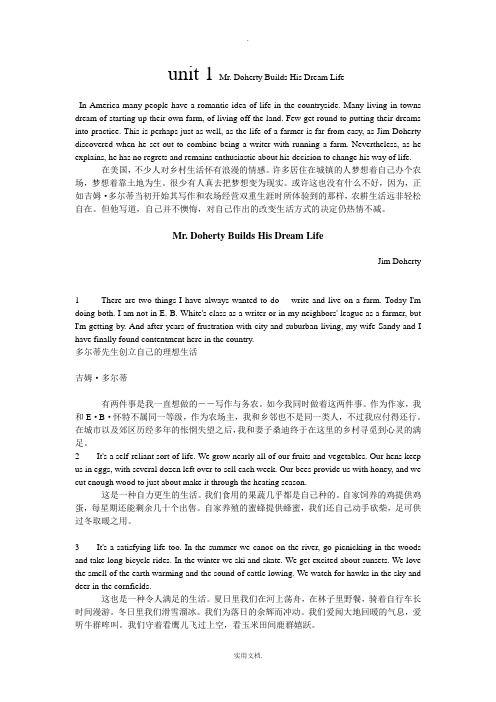
unit 1 Mr. Doherty Builds His Dream LifeIn America many people have a romantic idea of life in the countryside. Many living in towns dream of starting up their own farm, of living off the land. Few get round to putting their dreams into practice. This is perhaps just as well, as the life of a farmer is far from easy, as Jim Doherty discovered when he set out to combine being a writer with running a farm. Nevertheless, as he explains, he has no regrets and remains enthusiastic about his decision to change his way of life.在美国,不少人对乡村生活怀有浪漫的情感。
许多居住在城镇的人梦想着自己办个农场,梦想着靠土地为生。
很少有人真去把梦想变为现实。
或许这也没有什么不好,因为,正如吉姆·多尔蒂当初开始其写作和农场经营双重生涯时所体验到的那样,农耕生活远非轻松自在。
但他写道,自己并不懊悔,对自己作出的改变生活方式的决定仍热情不减。
Mr. Doherty Builds His Dream LifeJim Doherty1 There are two things I have always wanted to do -- write and live on a farm. Today I'm doing both. I am not in E. B. White's class as a writer or in my neighbors' league as a farmer, but I'm getting by. And after years of frustration with city and suburban living, my wife Sandy and I have finally found contentment here in the country.多尔蒂先生创立自己的理想生活吉姆·多尔蒂有两件事是我一直想做的――写作与务农。
全新版大学英语综合教程课文原文及翻译
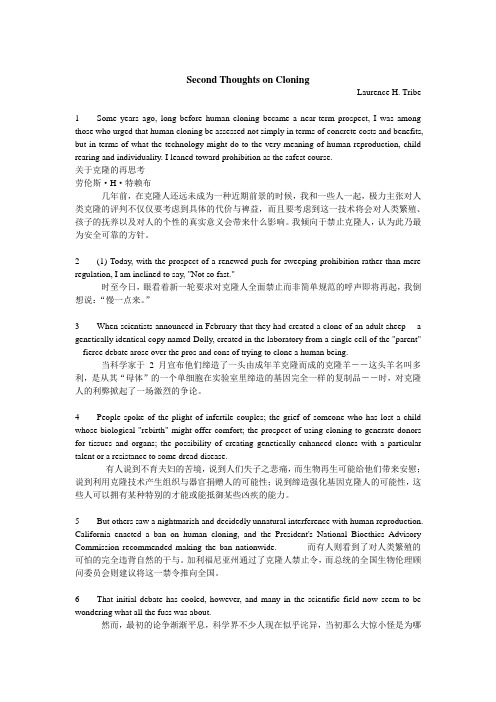
Second Thoughts on CloningLaurence H. Tribe1 Some years ago, long before human cloning became a near-term prospect, I was among those who urged that human cloning be assessed not simply in terms of concrete costs and benefits, but in terms of what the technology might do to the very meaning of human reproduction, child rearing and individuality. I leaned toward prohibition as the safest course.关于克隆的再思考劳伦斯·H·特赖布几年前,在克隆人还远未成为一种近期前景的时候,我和一些人一起,极力主张对人类克隆的评判不仅仅要考虑到具体的代价与裨益,而且要考虑到这一技术将会对人类繁殖、孩子的抚养以及对人的个性的真实意义会带来什么影响。
我倾向于禁止克隆人,认为此乃最为安全可靠的方针。
2 (1) Today, with the prospect of a renewed push for sweeping prohibition rather than mere regulation, I am inclined to say, "Not so fast."时至今日,眼看着新一轮要求对克隆人全面禁止而非简单规范的呼声即将再起,我倒想说:“慢一点来。
”3 When scientists announced in February that they had created a clone of an adult sheep -- a genetically identical copy named Dolly, created in the laboratory from a single cell of the "parent" -- fierce debate arose over the pros and cons of trying to clone a human being.当科学家于2月宣布他们缔造了一头由成年羊克隆而成的克隆羊――这头羊名叫多利,是从其“母体”的一个单细胞在实验室里缔造的基因完全一样的复制品――时,对克隆人的利弊掀起了一场激烈的争论。
全新版大学英语(第二版)综合教程1课文原文课文翻译

Unit 1 Growing UPPart Text A Writing for MyselfⅡWhen we are writing we are often told to keep our readers in mind, to shape what we say to fit their tastes and interests. But there is one reader in particular who should not be forgotten. Can you guess who? Russell Baker surprised himself and everyone else when he discovered the answer.我们写作时常常被告诫,脑子里要有读者,笔者所云一定要符合读者的口味和兴趣。
但有一位读者特别不该忘记。
你能猜出是谁吗?当拉塞尔·贝克找到这个问题的答案时,他自己和别人都感到大为惊讶。
Writing for MyselfRussell Baker1The idea of becoming a writer had come to me off and on since my childhood in Belleville, but it wasn't until my third year in high school that the possibility took hold. Until then I've been bored by everything associated with English courses. I found English grammar dull and difficult. I hated the assignments to turn out long, lifeless paragraphs that were agony for teachers to read and for me to write.为自己而写拉塞尔·贝克从孩提时代,我还住在贝尔维尔时,我的脑子里就断断续续地转着当作家的念头,但直等到我高中三年级,这一想法才有了实现的可能。
全新版大学英语综合教程3课文原文及翻译

全新版大学英语综合教程3课文原文及翻译《全新版大学英语综合教程 3 课文原文及翻译》大学英语学习对于许多学生来说是提升语言能力和拓展国际视野的重要途径。
全新版大学英语综合教程 3 更是其中的重要组成部分。
以下将为您呈现部分课文的原文及对应的翻译,希望能对您的学习有所帮助。
课文一:The Human Touch原文:John Blanchard stood up from the bench, straightened his Army uniform, and studied the crowd of people making their way through Grand Central Station翻译:约翰·布兰查德从长凳上站起身来,整了整军装,审视着穿过中央车站的人群。
原文:He looked for the girl whose heart he knew, but whose face he didn't, the girl with the rose翻译:他在寻找那个他明知其心却不知其貌的女孩,那个带着玫瑰的女孩。
原文:His interest in her had begun thirteen months before in a Florida library翻译:他对她的兴趣始于十三个月前在佛罗里达州的一家图书馆里。
原文:Taking a book off the shelf he found himself intrigued, not with the words of the book, but with the notes penciled in the margin 翻译:他从书架上取下一本书,发现自己感兴趣的不是书中的文字,而是写在页边空白处的铅笔字批注。
原文:The soft handwriting reflected a thoughtful soul and insightful mind翻译:那柔和的笔迹反映出一个深思熟虑、富有洞察力的灵魂。
全新版大学英语综合教程4课文原文及翻译

全新版大学英语综合教程4课文原文及翻译《全新版大学英语综合教程 4 课文原文及翻译》在大学英语的学习过程中,全新版大学英语综合教程 4 无疑是一本重要的教材。
其中的课文涵盖了丰富多样的主题和文体,对于提升英语语言能力和拓宽知识面都具有重要意义。
下面将为您呈现部分课文的原文及翻译。
课文一:The Tail of FameAn artist who seeks fame is like a dog chasing his own tail who, when he captures it, does not know what else to do but to continue chasing it The cruelty of success is that it often leads those who seek such success to participate in their own destruction"Don't quit your day job!" is advice frequently given by understandably pessimistic family members and friends to a budding artist who is trying hard to succeed The conquest of fame is difficult at best, and many end up emotionally if not financially bankrupt Still, impure motives such as the desire for worshipping fans and praise from peers may spur the artist on The lure of drowning in fame's imperial glory is not easily resisted Those who gain fame most often gain it as a result of exploiting their talent for singing, dancing, painting, or writing, etc They develop a style that agents market aggressively to hasten popularity, and their ride on the express elevator to the top is a blur Most would be hardpressed to tell you how theyeven got there Artists cannot remain idle, though When the performer, painter or writer becomes bored, their work begins to show a lack of continuity in its appeal and it becomes difficult to sustain the attention of the public After their enthusiasm has dissolved, the public simply moves on to the next flavor of the month Artists who do attempt to remain current by making even minute changes to their style of writing, dancing or singing,run a significant risk of losing the audience's favor The public simply discounts styles other than those for which the artist has become famousFamous authors' styles—such as Jane Austen's or Ernest Hemingway's—are easily recognizable The same is true of painters like Monet or Picasso The distinctive style of an artist, however, can become a trademark Whenthat happens, the artist becomes confined to that style If an artist is talented but not unique, fame will be fleeting Even if an artist possesses a unique style, fame is not guaranteed The market for art is fickle The public's appetite for a new style is insatiable The artist, like the politician, must often please the public in order to remain popular翻译:名声之尾追求名声的艺术家就像一只追着自己尾巴跑的狗,一旦抓住了尾巴,除了继续追着跑之外,不知道还能做什么。
全大学英语综合教程课文原文及翻译
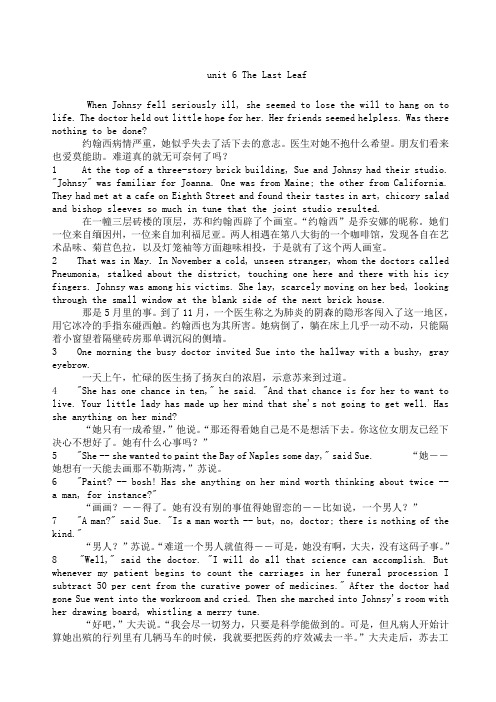
9 Johnsy lay, scarcely making a movement under the bedclothes, with her face toward the window. She was looking out and counting -- counting backward.
约翰西躺在被子下几乎一动不动,脸朝着窗。她望着窗外,数着数――倒数着数!
10 "Twelve," she said, and a little later "eleven"; and then "ten," and "nine"; and then "eight" and "seven," almost together.
约翰西病情严重,她似乎失去了活下去的意志。医生对她不抱什么希望。朋友们看来也爱莫能助。难道真的就无可奈何了吗?
1 At the top of a three-story brick building, Sue and Johnsy had their studio. "Johnsy" was familiar for Joanna. One was fromMaine; the other fromCalifornia. They had met at a cafe onEighth Streetand found their tastes in art, chicory salad and bishop sleeves so much in tune that the joint studio resulted.
大学英语综合教程3课文翻译
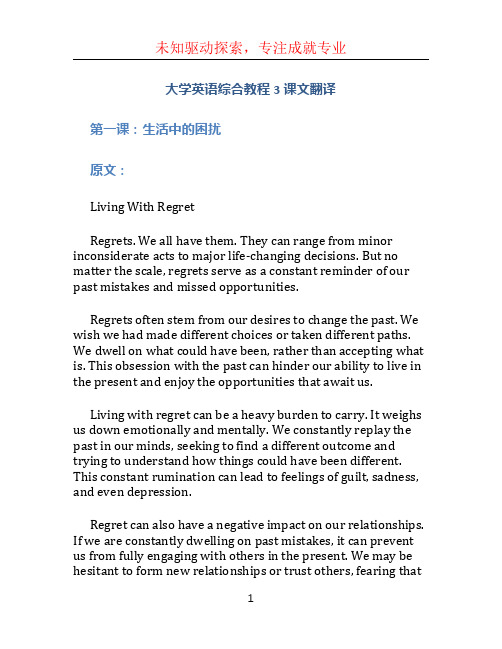
大学英语综合教程3课文翻译第一课:生活中的困扰原文:Living With RegretRegrets. We all have them. They can range from minor inconsiderate acts to major life-changing decisions. But no matter the scale, regrets serve as a constant reminder of our past mistakes and missed opportunities.Regrets often stem from our desires to change the past. We wish we had made different choices or taken different paths. We dwell on what could have been, rather than accepting what is. This obsession with the past can hinder our ability to live in the present and enjoy the opportunities that await us.Living with regret can be a heavy burden to carry. It weighs us down emotionally and mentally. We constantly replay the past in our minds, seeking to find a different outcome and trying to understand how things could have been different. This constant rumination can lead to feelings of guilt, sadness, and even depression.Regret can also have a negative impact on our relationships. If we are constantly dwelling on past mistakes, it can prevent us from fully engaging with others in the present. We may be hesitant to form new relationships or trust others, fearing thatwe will make the same mistakes again. This fear and hesitancy can limit our social connections and prevent us from experiencing the joys of deep and meaningful relationships.So how do we break free from the grip of regret? It starts with acceptance. Accepting that we cannot change the past, no matter how much we wish we could. We must forgive ourselves for our mistakes and learn from them. It is through learning and growth that we can move forward and create a better future.In addition to acceptance, it is important to focus on the present moment. By practicing mindfulness and being fully present in our daily lives, we can let go of the past and embrace the opportunities that come our way. Life is constantly changing, and if we are too focused on what has already happened, we may miss out on the beauty of what is happening right now.Regrets are a natural part of life, but they do not have to consume us. By accepting the past, focusing on the present, and learning from our mistakes, we can live a life free from the burden of regret.翻译:带着遗憾生活遗憾,我们都有。
新标准大学英语综合教程1(Unit1-Unit6课文翻译)
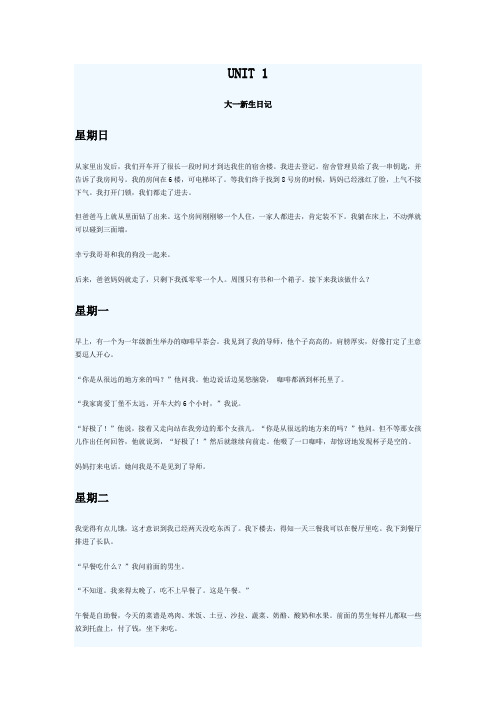
UNIT 1大一新生日记星期日从家里出发后,我们开车开了很长一段时间才到达我住的宿舍楼。
我进去登记。
宿舍管理员给了我一串钥匙,并告诉了我房间号。
我的房间在6楼,可电梯坏了。
等我们终于找到8号房的时候,妈妈已经涨红了脸,上气不接下气。
我打开门锁,我们都走了进去。
但爸爸马上就从里面钻了出来。
这个房间刚刚够一个人住,一家人都进去,肯定装不下。
我躺在床上,不动弹就可以碰到三面墙。
幸亏我哥哥和我的狗没一起来。
后来,爸爸妈妈就走了,只剩下我孤零零一个人。
周围只有书和一个箱子。
接下来我该做什么?星期一早上,有一个为一年级新生举办的咖啡早茶会。
我见到了我的导师,他个子高高的,肩膀厚实,好像打定了主意要逗人开心。
“你是从很远的地方来的吗?”他问我。
他边说话边晃悠脑袋,咖啡都洒到杯托里了。
“我家离爱丁堡不太远,开车大约6个小时,”我说。
“好极了!”他说,接着又走向站在我旁边的那个女孩儿。
“你是从很远的地方来的吗?”他问。
但不等那女孩儿作出任何回答,他就说到,“好极了!”然后就继续向前走。
他啜了一口咖啡,却惊讶地发现杯子是空的。
妈妈打来电话。
她问我是不是见到了导师。
星期二我觉得有点儿饿,这才意识到我已经两天没吃东西了。
我下楼去,得知一天三餐我可以在餐厅里吃。
我下到餐厅排进了长队。
“早餐吃什么?”我问前面的男生。
“不知道。
我来得太晚了,吃不上早餐了。
这是午餐。
”午餐是自助餐,今天的菜谱是鸡肉、米饭、土豆、沙拉、蔬菜、奶酪、酸奶和水果。
前面的男生每样儿都取一些放到托盘上,付了钱,坐下来吃。
我再也不觉得饿了。
妈妈打电话来。
她问我有没有好好吃饭。
星期三早上9点钟我要去听一个讲座。
我醒时已经8:45了。
竟然没有人叫我起床。
奇怪。
我穿好衣服,急匆匆地赶到大讲堂。
我在一个睡眼惺忪的女生旁边坐下。
她看了看我,问:“刚起床?”她是怎么看出来的?讲座进行了1个小时。
结束时我看了看笔记,我根本就看不懂自己写的字。
那个女生名叫苏菲,和我一样,也是英语文学专业的学生。
全新版大学英语综合教程1课文翻译(Unit1-Unit8)
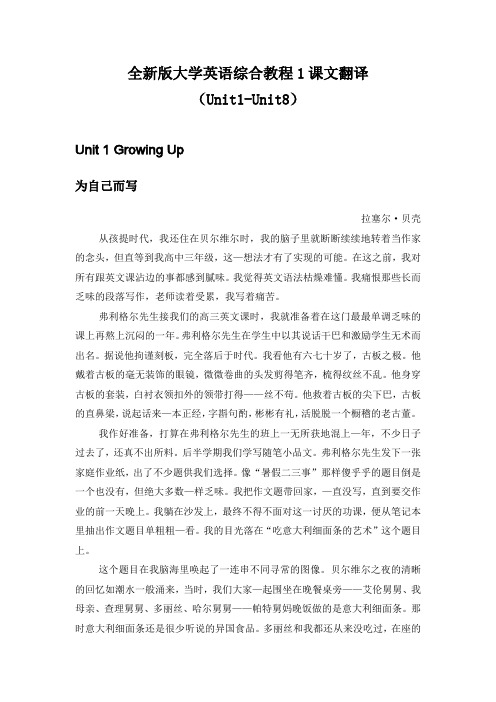
全新版大学英语综合教程1课文翻译(Unit1-Unit8)Unit 1 Growing Up为自己而写拉塞尔·贝壳从孩提时代,我还住在贝尔维尔时,我的脑子里就断断续续地转着当作家的念头,但直等到我高中三年级,这—想法才有了实现的可能。
在这之前,我对所有跟英文课沾边的事都感到腻味。
我觉得英文语法枯燥难懂。
我痛恨那些长而乏味的段落写作,老师读着受累,我写着痛苦。
弗利格尔先生接我们的高三英文课时,我就准备着在这门最最单调乏味的课上再熬上沉闷的一年。
弗利格尔先生在学生中以其说话干巴和激励学生无术而出名。
据说他拘谨刻板,完全落后于时代。
我看他有六七十岁了,古板之极。
他戴着古板的毫无装饰的眼镜,微微卷曲的头发剪得笔齐,梳得纹丝不乱。
他身穿古板的套装,白衬衣领扣外的领带打得——丝不苟。
他救着古板的尖下巴,古板的直鼻梁,说起话来—本正经,字斟句酌,彬彬有礼,活脱脱一个橱稽的老古董。
我作好准备,打算在弗利格尔先生的班上一无所获地混上—年,不少日子过去了,还真不出所料。
后半学期我们学写随笔小品文。
弗利格尔先生发下一张家庭作业纸,出了不少题供我们选择。
像“暑假二三事”那样傻乎乎的题目倒是一个也没有,但绝大多数—样乏味。
我把作文题带回家,—直没写,直到要交作业的前一天晚上。
我躺在沙发上,最终不得不面对这一讨厌的功课,便从笔记本里抽出作文题目单粗粗—看。
我的目光落在“吃意大利细面条的艺术”这个题目上。
这个题目在我脑海里唤起了一连串不同寻常的图像。
贝尔维尔之夜的清晰的回忆如潮水一般涌来,当时,我们大家—起围坐在晚餐桌旁——艾伦舅舅、我母亲、查理舅舅、多丽丝、哈尔舅舅——帕特舅妈晚饭做的是意大利细面条。
那时意大利细面条还是很少听说的异国食品。
多丽丝和我都还从来没吃过,在座的大人也是经验不足,没有—个吃起来得心应手的。
艾伦舅舅家诙谐有趣的场景全都重现在我的脑海中,我回想起来,当晚我们笑作—团,争论着该如何地把面条从盘子上送到嘴里才算合乎礼仪。
全新版大学英语综合教程课文原文及翻译
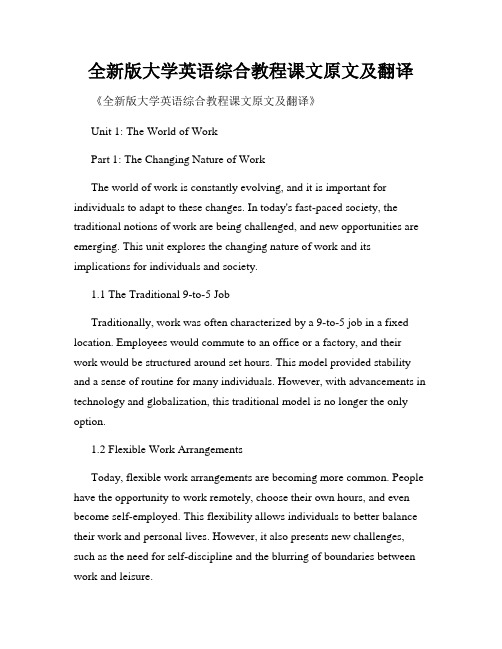
全新版大学英语综合教程课文原文及翻译《全新版大学英语综合教程课文原文及翻译》Unit 1: The World of WorkPart 1: The Changing Nature of WorkThe world of work is constantly evolving, and it is important for individuals to adapt to these changes. In today's fast-paced society, the traditional notions of work are being challenged, and new opportunities are emerging. This unit explores the changing nature of work and its implications for individuals and society.1.1 The Traditional 9-to-5 JobTraditionally, work was often characterized by a 9-to-5 job in a fixed location. Employees would commute to an office or a factory, and their work would be structured around set hours. This model provided stability and a sense of routine for many individuals. However, with advancements in technology and globalization, this traditional model is no longer the only option.1.2 Flexible Work ArrangementsToday, flexible work arrangements are becoming more common. People have the opportunity to work remotely, choose their own hours, and even become self-employed. This flexibility allows individuals to better balance their work and personal lives. However, it also presents new challenges, such as the need for self-discipline and the blurring of boundaries between work and leisure.1.3 The Gig EconomyThe rise of the gig economy is another significant change in the world of work. In this model, individuals take on short-term or freelance jobs, often facilitated by online platforms. This provides them with more autonomy and the ability to pursue multiple income streams. However, it also means less job security and benefits compared to traditional employment.1.4 The Importance of Lifelong LearningWith the changing nature of work, the importance of lifelong learning cannot be overstated. Individuals need to continually update their skills and knowledge in order to remain competitive in the job market. This includes developing new technological competencies and adaptability to navigate future changes in the workplace.Part 2: The Impact of Work on Identity and Well-beingWork plays a significant role in shaping individual identity and overall well-being. How individuals perceive their work and the meaning they derive from it can greatly impact their satisfaction and happiness.2.1 Work as a Source of IdentityFor many people, work is not just a way to earn a living but also a source of identity and purpose. The type of work one engages in can be closely tied to personal values and ambitions. However, it is important to recognize that work should not be the sole determinant of a person's self-worth. Finding a balance between work and other aspects of life is crucial for overall well-being.2.2 Work-Life BalanceAchieving work-life balance is a constant challenge in today's connected world. The boundaries between work and personal life can easily blur, leading to increased stress and burnout. Employers and individuals need to actively promote strategies and policies that enable employees to have a healthy integration of work and personal life.2.3 The Pursuit of Meaningful WorkMany individuals strive to find work that is not only financially rewarding but also personally fulfilling. Meaningful work gives individuals a sense of purpose and satisfaction. This can be achieved by aligning personal values and passions with one's chosen career path.2.4 Work and Mental HealthThe relationship between work and mental health is complex. While work can provide a sense of structure and purpose, it can also contribute to stress and anxiety. Employers and society as a whole need to prioritize mental health support in the workplace and foster a culture that promotes work-life balance and overall well-being.ConclusionThe world of work is undergoing significant changes, requiring individuals to adapt and embrace new opportunities. The impact of work on identity and well-being cannot be underestimated. It is crucial for individuals, employers, and society to work together to create a more balanced and fulfilling work environment. By recognizing the evolving nature of work andaddressing its challenges, we can create a future where individuals find meaning and satisfaction in their careers.。
大学英语教材课文译文

大学英语教材课文译文一、大学英语综合教程课文一:《生活在大自然中》In the Midst of NatureNature surrounds us and is an integral part of our lives. Our existence is closely tied to the natural world and its elements. The text "In the Midst of Nature" explores the different aspects of nature and emphasizes its importance.The text begins by highlighting the beauty and tranquility of nature. It describes how being immersed in nature can provide a sense of peace and calmness. The author encourages readers to appreciate the simple pleasures that nature offers, such as watching the sunrise or listening to the sound of a flowing stream.Furthermore, the text delves into the environmental benefits of nature. It emphasizes the role of trees in purifying the air we breathe and preventing soil erosion. The author also expounds on the importance of biodiversity and how different species contribute to the balance of ecosystems.Apart from the aesthetic and environmental value, the text also sheds light on the physical and mental health benefits of being in nature. It mentions how spending time in natural surroundings can boost one's immune system, reduce stress levels, and improve overall well-being. The author suggests engaging in outdoor activities, such as hiking or gardening, to reap these benefits.In addition, the text explores the cultural significance of nature. It explains how different cultures have revered and worshipped nature throughout history. The author mentions various traditions and rituals associated with natural elements, highlighting the deep connection between humans and the natural world.Overall, "In the Midst of Nature" serves as a reminder of how valuable and essential nature is. It encourages readers to embrace and appreciate the beauty of the natural world, and to recognize the various benefits it provides. By nurturing our relationship with nature, we can lead healthier, more fulfilling lives.课文二:《科技与社会》Technology and SocietyTechnology has revolutionized the way we live and has had a profound impact on society as a whole. The text "Technology and Society" delves into this topic, examining both the positive and negative aspects of technology in our lives.The text begins by highlighting the advancements technology has brought about. It mentions how it has enhanced communication, making it easier for people to connect and share information across the globe. It also discusses how technology has improved healthcare, transportation, and other industries, leading to increased efficiency and convenience.However, the text also addresses the potential drawbacks of technology. It raises concerns about its impact on employment, as automation and artificial intelligence continue to replace human workers. The text alsodiscusses the issue of privacy and the potential for surveillance in our increasingly interconnected world.Furthermore, the text touches upon the digital divide, emphasizing the gap between those who have access to technology and those who do not. It highlights the importance of bridging this divide to ensure equal opportunities for all individuals.Moreover, the text explores the ethical dilemmas posed by technology. It raises questions about the responsible use of technology, such as the ethical implications of genetic engineering and the responsibility of companies to protect user data.In conclusion, while technology has undoubtedly brought numerous benefits to society, it is crucial to approach its advancements with caution. The text "Technology and Society" provokes readers to reflect on the ethical, social, and economic ramifications of technology, encouraging them to consider how we can harness its advantages while minimizing its negative impacts. By doing so, we can build a more inclusive and sustainable future.。
新大学英语综合教程1-3单元课文翻译

Unit one 绿化,永无止境【1】环保主义思想已经深深的扎根于校园。
你可以看到环保运动已经蔓延到了全国,从加利福利亚大学戴维斯分校的“零浪费”运动场到纽约州瓦瑟学院07级学生献给学校的价值10000美元的太阳能电池板。
环保意识已经深入到同学们的内心,他们通过开展一些竞赛活动来推进回收再利用,并且大幅减少学生宿舍能源的使用。
学校里还开设了一些与环境相关的课程与专业,甚至还设立了一些奖学金。
这些新的举措是很有意义的。
高等教育明确定位,不仅是要为社会培养有环保意识的公民,还要培养环保工程师,环保建筑师和环保政策的制定者。
康奈尔大学的校长David Skorton说得好:“可持续发展势在必行。
”【2】想要寻找环保运动已经广泛开展的证据,只要关注全国各大学都热衷参与RecycleMania 竞赛就能找到答案。
2008年的冠军不是像哈佛和斯坦福大学这些以环保著称的著名学府,而是在密歇根州的一所微不足道的大学——卡拉马祖大学。
在十周的比赛中,卡拉马祖大学的同学们总共回收利用了59%的废物。
(哈佛是27%,斯坦福是30%)。
环保社团的成员们还开展了名为“宿舍风暴”的活动。
他们在每个寝室都埋伏了同学来专门观察和宣传那些减少浪费的行为。
他们还收集校内垃圾桶内的可回收材料——甚至运送塑料泡沫和废旧电脑到公司以便加工后再利用。
他们把废弃的书拆开来使得纸张可以再利用。
一些旧的椅子、杯子、扬声器和钢琴都在校园的二手货交易中重获新生,满屋子都是一些二手货,当然还是免费的。
【3】环保建筑也如春笋般突然出现在校园中,从杜克大学里带有环保屋顶的“智慧屋” (一间同时可作为绿色生活实验室的宿舍)到加州大学在默赛德新校区,那里的所有建筑都达到了美国绿色建筑委员会制定的标准。
缅因州的福尔曼大学也实施了一项最不寻常的计划。
在2008年6月,福尔曼大学与南方生活杂志协力创建了名为“绝壁村屋”的太阳能展示区。
它占地3400平方英尺,在将来也许会成为环保主义者的梦想住宅。
全新版大学英语综合教程4课文原文及翻译
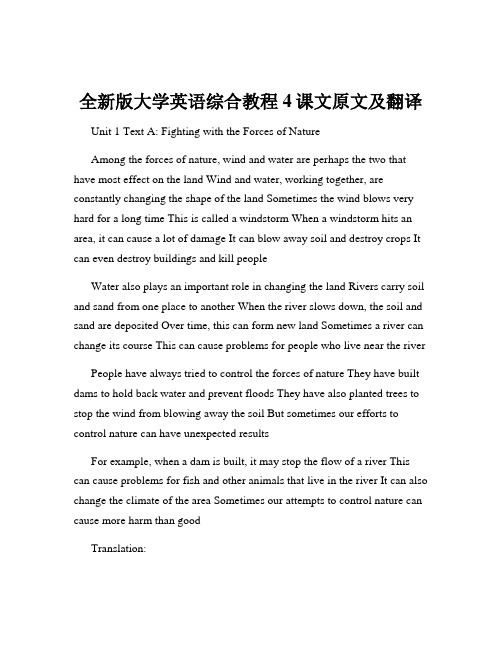
全新版大学英语综合教程4课文原文及翻译Unit 1 Text A: Fighting with the Forces of NatureAmong the forces of nature, wind and water are perhaps the two that have most effect on the land Wind and water, working together, are constantly changing the shape of the land Sometimes the wind blows very hard for a long time This is called a windstorm When a windstorm hits an area, it can cause a lot of damage It can blow away soil and destroy crops It can even destroy buildings and kill peopleWater also plays an important role in changing the land Rivers carry soil and sand from one place to another When the river slows down, the soil and sand are deposited Over time, this can form new land Sometimes a river can change its course This can cause problems for people who live near the riverPeople have always tried to control the forces of nature They have built dams to hold back water and prevent floods They have also planted trees to stop the wind from blowing away the soil But sometimes our efforts to control nature can have unexpected resultsFor example, when a dam is built, it may stop the flow of a river This can cause problems for fish and other animals that live in the river It can also change the climate of the area Sometimes our attempts to control nature can cause more harm than goodTranslation:在自然力量中,风和水也许是对陆地影响最大的两种力量。
全新版大学英语综合教程 课文原文及翻译

式的看法。
Learning, Chinese-Sty a month in the spring of 1987, my wife Ellen and I lived in the bustling eastern
我的中国同行�除了少数几个人外�对此事的态度与金陵饭店工作人员一样。既然大
人知道怎么把钥匙塞进槽口——这是处理槽口一事的最终目的� 既然孩子还很年幼�还没
有灵巧到可以独自完成要做的动作�让他自己瞎折腾会有什么好处呢�他很有可能会灰心丧
气发脾气——这当然不是所希望的结果。为什么不教他怎么做呢�他会高兴�他还能早些学
我俩颇为同情地听着这一番道理�解释道�首先�我们并不在意本杰明能不能把钥匙
5 I soon realized that this incident was directly relevant to our assigned tasks in China: to
investigate the ways of early childhood education (especially in the arts), and to throw light on
in the difference between Chinese and American ideas of education came not in the classroom but
in the lobby of the Jinling Hotel where we stayed in Nanjing. 中国式的学习风格
─ and on occasion would frown slightly, as if considering us to be neglecting our parental duties. 我和埃伦都满不在乎�任由本杰明拿着钥匙在钥匙的槽口鼓捣。他的探索行为似乎并
全新版大学英语综合教程3课文原文及翻译

u nit 1 Mr.Doherty Bu ilds His D ream LifeIn Ameri ca many pe ople havea romantic idea of l ife in the countrysi de. Many l iving in t owns dream of starti ng up thei r own farm, of livin g off theland. Fewget roundto putting their dre ams into p ractice. T his is per haps justas well, a s the life of a farm er is farfrom easy,as Jim Do herty disc overed whe n he set o ut to comb ine beinga writer w ith runnin g a farm.Neverthele ss, as heexplains,he has noregrets an d remainsenthusiast ic about h is decisio n to chang e his wayof life. 在美国,不少人对乡村生活怀有浪漫的情感。
许多居住在城镇的人梦想着自己办个农场,梦想着靠土地为生。
很少有人真去把梦想变为现实。
或许这也没有什么不好,因为,正如吉姆·多尔蒂当初开始其写作和农场经营双重生涯时所体验到的那样,农耕生活远非轻松自在。
但他写道,自己并不后悔,对自己作出的改变生活方式的决定仍热情不减。
Mr. Dohe rty Builds His Dream LifeJim Doherty 1 Th ere are tw o things I have alwa ys wantedto do -- w rite and l iveon a f arm. Today I'm doing both. I a m not in E. B. White's class a s a writer or in myneighbors'league as a farmer, but I'm g etting by.And after years offrustratio n with cit y and subu rban livin g, my wife Sandy and I have fi nally foun d contentm ent here i n the coun try.多尔蒂先生创建自己的理想生活吉姆·多尔蒂有两件事是我一直想做的――写作与务农。
大学英语综合教程课文原文及翻译
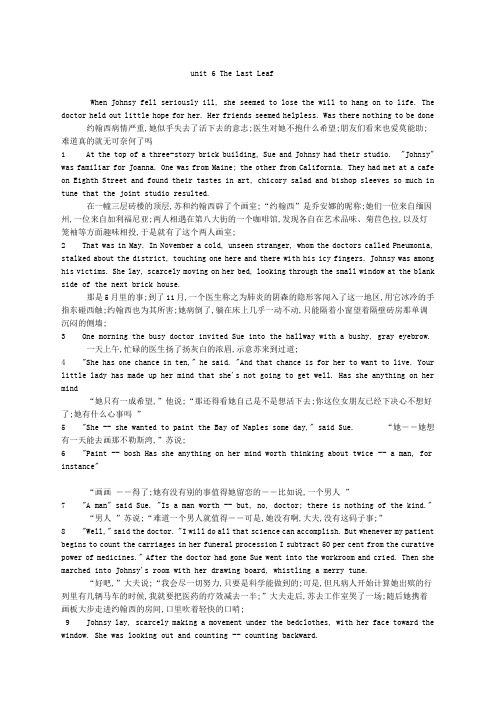
unit 6 The Last LeafWhen Johnsy fell seriously ill, she seemed to lose the will to hang on to life. The doctor held out little hope for her. Her friends seemed helpless. Was there nothing to be done 约翰西病情严重,她似乎失去了活下去的意志;医生对她不抱什么希望;朋友们看来也爱莫能助;难道真的就无可奈何了吗1 At the top of a three-story brick building, Sue and Johnsy had their studio. "Johnsy" was familiar for Joanna. One was from Maine; the other from California. They had met at a cafe on Eighth Street and found their tastes in art, chicory salad and bishop sleeves so much in tune that the joint studio resulted.在一幢三层砖楼的顶层,苏和约翰西辟了个画室;“约翰西”是乔安娜的昵称;她们一位来自缅因州,一位来自加利福尼亚;两人相遇在第八大街的一个咖啡馆,发现各自在艺术品味、菊苣色拉,以及灯笼袖等方面趣味相投,于是就有了这个两人画室;2 That was in May. In November a cold, unseen stranger, whom the doctors called Pneumonia, stalked about the district, touching one here and there with his icy fingers. Johnsy was among his victims. She lay, scarcely moving on her bed, looking through the small window at the blank side of the next brick house.那是5月里的事;到了11月,一个医生称之为肺炎的阴森的隐形客闯入了这一地区,用它冰冷的手指东碰西触;约翰西也为其所害;她病倒了,躺在床上几乎一动不动,只能隔着小窗望着隔壁砖房那单调沉闷的侧墙;3 One morning the busy doctor invited Sue into the hallway with a bushy, gray eyebrow.一天上午,忙碌的医生扬了扬灰白的浓眉,示意苏来到过道;4 "She has one chance in ten," he said. "And that chance is for her to want to live. Your little lady has made up her mind that she's not going to get well. Has she anything on her mind“她只有一成希望,”他说;“那还得看她自己是不是想活下去;你这位女朋友已经下决心不想好了;她有什么心事吗”5 "She -- she wanted to paint the Bay of Naples some day," said Sue. “她――她想有一天能去画那不勒斯湾,”苏说;6 "Paint -- bosh Has she anything on her mind worth thinking about twice -- a man, for instance"“画画――得了;她有没有别的事值得她留恋的――比如说,一个男人”7 "A man" said Sue. "Is a man worth -- but, no, doctor; there is nothing of the kind."“男人”苏说;“难道一个男人就值得――可是,她没有啊,大夫,没有这码子事;”8 "Well," said the doctor. "I will do all that science can accomplish. But whenever my patient begins to count the carriages in her funeral procession I subtract 50 per cent from the curative power of medicines." After the doctor had gone Sue went into the workroom and cried. Then she marched into Johnsy's room with her drawing board, whistling a merry tune.“好吧,”大夫说;“我会尽一切努力,只要是科学能做到的;可是,但凡病人开始计算她出殡的行列里有几辆马车的时候,我就要把医药的疗效减去一半;”大夫走后,苏去工作室哭了一场;随后她携着画板大步走进约翰西的房间,口里吹着轻快的口哨;9 Johnsy lay, scarcely making a movement under the bedclothes, with her face toward the window. She was looking out and counting -- counting backward.约翰西躺在被子下几乎一动不动,脸朝着窗;她望着窗外,数着数――倒数着数10 "Twelve," she said, and a little later "eleven"; and then "ten," and "nine"; and then "eight" and "seven," almost together.“12,”她数道,过了一会儿“11”,接着数“10”和“9”;再数“8”和“7”,几乎一口同时数下来;11 Sue looked out of the window. What was there to count There was only a bare, dreary yard to be seen, and the blank side of the brick house twenty feet away. An old, old ivy vine climbed half way up the brick wall. The cold breath of autumn had blown away its leaves, leaving it almost bare.苏朝窗外望去;外面有什么好数的呢外面只看到一个空荡荡的沉闷的院子,还有20英尺开外那砖房的侧墙,上面什么也没有;一棵古老的常青藤爬到半墙高;萧瑟秋风吹落了枝叶,藤上几乎光秃秃的; 12 "Six," said Johnsy, in almost a whisper. "They're falling faster now. Three days ago there were almost a hundred. It made my head ache to count them. But now it's easy. There goes another one. There are only five left now."“6”,约翰西数着,声音几乎听不出来;“现在叶子掉落得快多了;三天前差不多还有100片;数得我头都疼;可现在容易了;又掉了一片;这下子只剩5片了;”13 "Five what, dear "“5片什么,亲爱的”14 "Leaves. On the ivy vine. When the last one falls I must go, too. I've known that for three days. Didn't the doctor tell you"“叶子;常青藤上的叶子;等最后一片叶子掉了,我也就得走了;三天前我就知道会这样;大夫没跟你说吗”15 "Oh, I never heard of such nonsense. What have old ivy leaves to do with your getting well Don't be so silly. Why, the doctor told me this morning that your chances for getting well real soon were ten to one Try to take some soup now, and let Sudie go and buy port wine for her sick child."“噢,我从没听说过这种胡说八道;常青藤叶子跟你病好不好有什么关系别这么傻;对了,大夫上午跟我说,你的病十有八九就快好了;快喝些汤,让苏迪给她生病的孩子去买些波尔图葡萄酒来;”16 "You needn't get any more wine," said Johnsy, keeping her eyes fixed out the window. "There goes another. No, I don't want any soup. That leaves just four. I want to see the last one fall before it gets dark. Then I'll go, too. I'm tired of waiting. I'm tired of thinking.I want to turn loose my hold on everything, and go sailing down, down, just like one of those poor, tired leaves."“你不用再去买酒了,”约翰西说道,两眼一直盯着窗外;“又掉了一片;不,我不想喝汤;这一下只剩下4片了;我要在天黑前看到最后一片叶子掉落;那时我也就跟着走了;我都等腻了;也想腻了;我只想撇开一切, 飘然而去,就像那边一片可怜的疲倦的叶子;”17 "Try to sleep," said Sue. "I must call Behrman up to be my model for the old miner. I'll not be gone a minute."“快睡吧,”苏说;“我得叫贝尔曼上楼来给我当老矿工模特儿;我去去就来;”18 Old Behrman was a painter who lived on the ground floor beneath them. He was past sixty and had a long white beard curling down over his chest. Despite looking the part, Behrman was a failure in art. For forty years he had been always about to paint a masterpiece, but had never yet begun it. He earned a little by serving as a model to those young artists who could not pay the price of a professional. He drank gin to excess, and still talked of his coming masterpiece. For the rest he was a fierce little old man, who mocked terribly at softness in any one, and who regarded himself as guard dog to the two young artists in the studio above.老贝尔曼是住在两人楼下底层的一个画家;他已年过六旬,银白色蜷曲的长髯披挂胸前;贝尔曼看上去挺像艺术家,但在艺术上却没有什么成就;40年来他一直想创作一幅传世之作,却始终没能动手;他给那些请不起职业模特的青年画家当模特挣点小钱;他没节制地喝酒,谈论着他那即将问世的不朽之作;要说其他方面,他是个好斗的小老头,要是谁表现出一点软弱,他便大肆嘲笑,并把自己看成是楼上画室里两位年轻艺术家的看护人;19 Sue found Behrman smelling strongly of gin in his dimly lighted studio below. In one corner was a blank canvas on an easel that had been waiting there for twenty-five years to receive the first line of the masterpiece. She told him of Johnsy's fancy, and how she feared she would, indeed, light and fragile as a leaf herself, float away, when her slight hold upon the world grew weaker. Old Behrman, with his red eyes plainly streaming, shouted his contempt for such foolish imaginings.苏在楼下光线暗淡的画室里找到了贝尔曼,他满身酒味刺鼻;屋子一角的画架上支着一张从未落过笔的画布,在那儿搁了25年,等着一幅杰作的起笔;苏把约翰西的怪念头跟他说了,并说约翰西本身就像一片叶子又瘦又弱,她害怕要是她那本已脆弱的生存意志再软下去的话,真的会凋零飘落;老贝尔曼双眼通红,显然是泪涟涟的,他大声叫嚷着说他蔑视这种傻念头;20 "What" he cried. "Are there people in the world foolish enough to die because leafs drop off from a vine I have never heard of such a thing. Why do you allow such silly ideas to come into that head of hers God This is not a place in which one so good as Miss Johnsy should lie sick. Some day I will paint a masterpiece, and we shall all go away. Yes."“什么”他嚷道;“世界上竟然有这么愚蠢的人,因为树叶从藤上掉落就要去死我听都没听说过这等事;你怎么让这种傻念头钻到她那个怪脑袋里天哪这不是一个像约翰西小姐这样的好姑娘躺倒生病的地方;有朝一日我要画一幅巨作,那时候我们就离开这里;真的;”21 Johnsy was sleeping when they went upstairs. Sue pulled the shade down, and motioned Behrman into the other room. In there they peered out the window fearfully at the ivy vine. Then they looked at each other for a moment without speaking. A persistent, cold rain was falling, mingled with snow. Behrman, in his old blue shirt, took his seat as the miner on an upturned kettle for a rock.两人上了楼,约翰西已经睡着了;苏放下窗帘,示意贝尔曼去另一个房间;在那儿两人惶惶不安地凝视着窗外的常青藤;接着两人面面相觑,哑然无语;外面冷雨夹雪,淅淅沥沥;贝尔曼穿着破旧的蓝色衬衣, 坐在充当矿石的倒置的水壶上,摆出矿工的架势;22 When Sue awoke from an hour's sleep the next morning she found Johnsy with dull, wide-open eyes staring at the drawn green shade.第二天早上,只睡了一个小时的苏醒来看到约翰西睁大着无神的双眼,凝望着拉下的绿色窗帘;23 "Pull it up; I want to see," she ordered, in a whisper.“把窗帘拉起来;我要看,”她低声命令道;24 Wearily Sue obeyed.苏带着疲倦,遵命拉起窗帘;25 But, Lo after the beating rain and fierce wind that had endured through the night, there yet stood out against the brick wall one ivy leaf. It was the last on the vine. Still dark green near its stem, but with its edges colored yellow, it hung bravely from a branch some twenty feet above the ground.可是,瞧经过一整夜的急风骤雨,竟然还存留一片常青藤叶,背靠砖墙,格外显目;这是常青藤上的最后一片叶子;近梗部位仍呈暗绿色,但边缘已经泛黄了,它无所畏惧地挂在离地20多英尺高的枝干上;26 "It is the last one," said Johnsy. "I thought it would surely fall during the night.I heard the wind. It will fall today, and I shall die at the same time."“这是最后一片叶子,”约翰西说;“我以为夜里它肯定会掉落的;我晚上听到大风呼啸;今天它会掉落的,叶子掉的时候,也是我死的时候;”27 The day wore away, and even through the twilight they could see the lone ivy leaf clinging to its stem against the wall. And then, with the coming of the night the north wind was again loosed.白天慢慢过去了,即便在暮色黄昏之中,他们仍能看到那片孤零零的常青藤叶子,背靠砖墙,紧紧抱住梗茎;尔后,随着夜幕的降临,又是北风大作;28 When it was light enough Johnsy, the merciless, commanded that the shade be raised.等天色亮起,冷酷无情的约翰西命令将窗帘拉起;29 The ivy leaf was still there.常青藤叶依然挺在;30 Johnsy lay for a long time looking at it. And then she called to Sue, who was stirring her chicken soup over the gas stove.约翰西躺在那儿,望着它许久许久;接着她大声呼唤正在煤气灶上搅鸡汤的苏;31 "I've been a bad girl, Sudie," said Johnsy. "Something has made that last leaf stay there to show me how wicked I was. It is a sin to want to die. You may bring me a little soup now, and some milk with a little port in it and -- no; bring me a hand-mirror first, and then pack some pillows about me, and I will sit up and watch you cook."“我一直像个不乖的孩子,苏迪,”约翰西说;“有一种力量让那最后一片叶子不掉,好让我看到自己有多坏;想死是一种罪过;你给我喝点汤吧,再来点牛奶,稍放一点波尔图葡萄酒――不,先给我拿面小镜子来,弄几个枕头垫在我身边,我要坐起来看你做菜;”32 An hour later she said:一个小时之后,她说:33 "Sudie, some day I hope to paint the Bay of Naples."“苏迪,我真想有一天去画那不勒斯海湾;”34 The doctor came in the afternoon, and Sue had an excuse to go into the hallway as he left.下午大夫来了,他走时苏找了个借口跟进了过道;35 "Even chances," said the doctor, taking Sue's thin, shaking hand in his.“现在是势均力敌,”大夫说着,握了握苏纤细颤抖的手;36 "With good nursing you'll win. And now I must see another case I have downstairs. Behrman, his name is -- some kind of an artist, I believe. Pneumonia, too. He is an old, weak man, and the attack is acute. There is no hope for him; but he goes to the hospital today to be made more comfortable."“只要精心照料,你就赢了;现在我得去楼下看另外一个病人了;贝尔曼,是他的名字――记得是个什么画家;也是肺炎;他年老体弱,病来势又猛;他是没救了;不过今天他去了医院,照料得会好一点;”37 The next day the doctor said to Sue: "She's out of danger. You've won. The right food and care now -- that's all."第二天,大夫对苏说:“她脱离危险了;你赢了;注意饮食,好好照顾,就行了;”38 And that afternoon Sue came to the bed where Johnsy lay and put one arm around her.当日下午,苏来到约翰西的床头,用一只手臂搂住她;39 "I have something to tell you, white mouse," she said. "Mr. Behrman died of pneumonia today in the hospital. He was ill only two days. He was found on the morning of the first day in his room downstairs helpless with pain. His shoes and clothing were wet through and icy cold. They couldn't imagine where he had been on such a terrible night. And then they found a lantern, still lighted, and a ladder that had been dragged from its place, and some scatteredbrushes, and a palette with green and yellow colors mixed on it, and -- look out the window, dear, at the last ivy leaf on the wall. Didn't you wonder why it never fluttered or moved when the wind blew Ah, darling, it's Behrman's masterpiece -- he painted it there the night that the last leaf fell." “我跟你说件事,小白鼠,”她说;“贝尔曼先生今天在医院里得肺炎去世了;他得病才两天;发病那天上午人家在楼下他的房间里发现他疼得利害;他的鞋子衣服都湿透了,冰冷冰冷的;他们想不出那么糟糕的天气他夜里会去哪儿;后来他们发现了一个灯笼,还亮着,还有一个梯子被拖了出来,另外还有些散落的画笔,一个调色板,和着黄绿两种颜色,――看看窗外,宝贝儿,看看墙上那最后一片常青藤叶子;它在刮风的时候一动也不动,你没有觉得奇怪吗啊,亲爱的,那是贝尔曼的杰作――最后一片叶子掉落的那天夜里他画上了这片叶子;”He did not trust the woman to trust him. And he did not trust the woman not to trust him. And he did not want to be mistrusted now.他不敢相信这个女人居然会信任自己;他也不认为这个女人就不信任自己;不过,现在他不想失去别人对自己的信任;unit 7 Life of a SalesmanMaking a living as a door-to-door salesman demands a thick skin, both to protect against the weather and against constantly having the door shut in your face. Bill Porter puts up with all this and much, much more.干挨家挨户上门推销这一营生得脸皮厚,这是因为干这一行不仅要经受风吹日晒,还要承受一次又一次的闭门羹;比尔·波特忍受着这一切,以及别的种种折磨;Life of a SalesmanTom Hallman Jr.1 The alarm rings. It's 5:45. He could linger under the covers, listening to the radio and a weatherman who predicts rain. People would understand. He knows that.一个推销员的生活小汤姆·霍尔曼闹钟响了;是清晨5:45;他可以在被子里再躺一会儿,听听无线电广播;天气预报员预报有雨;人们会理解的;这点他清楚;2 A surgeon's scar cuts across his lower back. The fingers on his right hand are so twisted that he can't tie his shoes. Some days, he feels like surrendering. But his dead mother's challenge echoes in his soul. So, too, do the voices of those who believed him stupid, incapable of living independently. All his life he's struggled to prove them wrong. He will not quit.3 And so Bill Porter rises.他的下背有一道手术疤痕;他右手的手指严重扭曲,连鞋带都没法系;有时,他真想放弃不干了;可在他内心深处,一直回响着已故老母的激励, 还有那些说他蠢,说他不能独立生活的人的声音;他一生都在拚命去证明他们错了;他决不能放弃不干;于是比尔·波特起身了;4 He takes the first unsteady steps on a journey to Portland's streets, the battlefield where he fights alone for his independence and dignity. He's a door-to-door salesman. Sixty-three years old. And his enemies -- a crippled body that betrays him and a changing world that no longer needs him -- are gaining on him.他摇摇晃晃迈出了去波特兰大街的头几步,波特兰大街是他为独立与尊严而孤身搏杀的战场;他是个挨家挨户上门推销的推销员,今年63岁;他的敌人――辜负他的残疾的身体和一个不再需要他的变化着的世界――正一步一步把他逼向绝境;5 With trembling hands he assembles his weapons: dark slacks, blue shirt and matching jacket, brown tie, tan raincoat and hat. Image, he believes, is everything.他用颤抖的双手收拾行装:深色宽松裤,蓝衬衣和与之相配的茄克衫,褐色领带,土褐色雨衣和帽子;在他看来,形象就是一切;6 He stops in the entryway, picks up his briefcase and steps outside. A fall wind has kicked up. The weatherman was right. He pulls his raincoat tighter.7 He tilts his hat just so. 他在门口停了一下,提起公文包,走了出去;秋风骤起,冷飕飕的;天气预报员说得没错;他将雨衣裹裹紧;他把帽子往一侧微微一斜;8 On the 7:45 bus that stops across the street, he leaves his briefcase next to the driver and finds a seat in the middle of a pack of bored teenagers.在街对面停靠的7:45那班公共汽车上,他把公文包放在司机身旁,在一群没精打采的十几岁的孩子当中找了个位子坐下;9 He leans forward, stares toward the driver, sits back, then repeats the process. His nervousness makes him laugh uncontrollably. The teenagers stare at him. They don't realize Porter's afraid someone will steal his briefcase, with the glasses, brochures, order forms and clip-on tie that he needs to survive.他身子往前一倾,盯着司机那儿望,然后靠着椅背坐下,接着他又反复这个过程;他心情紧张,控制不住自己而笑出声来;那些孩子望着他;他们不明白,波特是担心有人偷他的包,包里有他生存不可缺少的眼镜,宣传小册子,定单,以及可用别针别上的领带;10 Porter senses the stares. He looks at the floor.波特意识到了小孩子在盯着他看;他把目光转向车厢地板;11 His face reveals nothing. In his heart, though, he knows he should have been like these kids, like everyone on this bus. He's not angry. But he knows. His mother explained how the delivery had been difficult, how the doctor had used an instrument that crushed a section of his brain and caused cerebral palsy, a disorder of the nervous system that affects his speech, hands and walk.他脸上没有流露出任何神情;但在他心里,他知道自己本该和这些孩子一样,和车上其他所有人一样;他并不生气;但他心里明白;他母亲解释说生他时难产,医生使用了某种器械,损坏了他大脑的一部分,导致了大脑性麻痹,一种影响他说话,手部活动以及行走的神经系统的紊乱;12 Porter came to Portland when he was 13 after his father, a salesman, was transferred here. He attended a school for the disabled and then Lincoln High School, where he was placed in a class for slow kids.波特13岁那年随着当推销员的父亲工作调动来到波特兰;他上了一个残疾人学校,后来就读林肯高级中学,在那儿他被编入慢班;13 But he wasn't slow.但他并不笨;14 His mind was trapped in a body that didn't work. Speaking was difficult and took time. People were impatient and didn't listen. He felt different -- was different -- from the kids who rushed about in the halls and planned dances he would never attend.他由于身体不能正常运行而使脑子不能充分发挥其功能;他说话困难,而且慢;别人不耐烦,不听他说;他觉得自己不同于――事实上也确实不同于――那些在过道里东奔西跑的孩子,那些孩子安排的舞会他永远也不可能参加;15 What could his future be Porter wanted to do something and his mother was certain that he could rise above his limitations. With her encouragement, he applied for a job with the Fuller Brush Co. only to be turned down. He couldn't carry a product briefcase or walk a route, they said.他将来会是个什么样子呢波特想做些事,母亲也相信他能冲破身体的局限;在她的鼓励之下,他向福勒牙刷公司申请一份工作,结果却遭到拒绝;他不能提样品包,也不能跑一条推销线路,他们说;16 Porter knew he wanted to be a salesman. He began reading help wanted ads in the newspaper. When he saw one for Watkins, a company that sold household products door-to-door, his mother set up a meeting with a representative. The man said no, but Porter wouldn't listen. He just wanted a chance. The man gave in and offered Porter a section of the city that no salesman wanted.波特知道自己想当推销员;他开始阅读报纸上的招聘广告;他看到沃特金斯,一家上门推销家用物品的公司要人,他母亲就跟其代理人安排会面;那人说不行,可波特不予理会;他就是需要一个机会;那人让步了,把城里一个其他推销员都不要的区域派给了他;17 It took Porter four false starts before he found the courage to ring the first doorbell. The man who answered told him to go away, a pattern repeated throughout the day.波特一开始四次都没敢敲门,第五次才鼓起勇气按了第一户人家的门铃;开门的那人让他走开,这种情形持续了一整天;18 That night Porter read through company literature and discovered the products were guaranteed. He would sell that pledge. He just needed people to listen.当晚,波特仔细阅读了公司的宣传资料,发现产品都是保用的;他要把保用作为卖点;只要别人肯听他说话就成;19 If a customer turned him down, Porter kept coming back until they heard him. And he sold.要是客户回绝波特,拒绝倾听他的介绍,他就一再上门;就这样他将产品卖了出去;20 For several years he was Watkins' top retail salesman. Now he is the only one of the company's 44,000 salespeople who sells door-to-door.他连着几年都是沃特金斯公司的最佳零售推销员;如今他是该公司44000名推销员中惟一一个上门推销的人;21 The bus stops in the Transit Mall, and Porter gets off.公共汽车在公交中转购物中心站停下,波特下了车;22 His body is not made for walking. Each step strains his joints. Headaches are constant visitors. His right arm is nearly useless. He can't fully control the limb. His body tilts at the waist; he seems to be heading into a strong, steady wind that keeps him off balance. At times, he looks like a toddler taking his first steps.他的身体不适合行走;每走一步关节都疼;头疼也是习以为常的事;他的右臂几乎没用;他不能完全控制这只手臂;他的身体从腰部开始前倾,看上去就像是顶着一股强劲的吹个不停的风迈步向前,风似乎要把他刮倒;有时他看上去就像是个刚刚学步的孩童;23 He walks 10 miles a day.他每天要走10英里的路程;24 His first stop today, like every day, is a shoeshine stand where employees tie his laces. Twice a week he pays for a shine. At a nearby hotel one of the doormen buttons Porter's top shirt button and slips on his clip-on tie. He then walks to another bus that drops him off a mile from his territory.像平日一样,他今天的第一站是个擦鞋摊,这里的雇员替他系好鞋带;他每周请他们擦两次鞋;附近一家旅馆的门卫替他扣上衬衣最上面一粒纽扣,戴上用别针别上的领带;随后他步行去搭乘另一部巴士,在距离他的推销区域一英里处下车;25 He left home nearly three hours ago.他是差不多3个小时前从家里动身的;26 The wind is cold and raindrops fall. Porter stops at the first house. This is the moment he's been preparing for since 5:45 a.m. He rings the bell.风冷雨淋;波特在第一户人家门前停了下来;这是他从5:45分开始就为之准备的时刻;他按了门铃;27 A woman comes to the door.一位妇人开了门;28 "Hello."29 "No, thank you, I'm just preparing to leave."30 Porter nods.31 "May I come back later" he asks.32 "No," says the woman.33 She shuts the door.34 Porter's eyes reveal nothing.35 He moves to the next house.36 The door opens.37 Then closes.“你好;”“不,多谢了;我这就要出门;”波特点点头;“那我过会儿来,可以吗”他问;“不用了,”那妇人回答道;她关上了门;波特眼里没有流露丝毫神情;他转向下一个人家;门开了;随即又关上;38 He doesn't get a chance to speak. Porter's expression never changes. He stops at every home in his territory. People might not buy now. Next time. Maybe. No doesn't mean never. Some of his best customers are people who repeatedly turned him down before buying.他连开口说话的机会都没有;波特的表情从不改变;他敲开自己推销区内的每一个家门;人们现在可能不买什么;也许下一次会买;现在不买不等于永远不买;他的一些老客户都是那些多次把他拒之门外而后来才买的人;39 He makes his way down the street.40 "I don't want to try it."41 "Maybe next time."42 "I'm sorry. I'm on the phone right now."43 "No."他沿着街道往前走;“我不想试用这个产品;”“也许下次试一试;”“对不起;我在打电话;”“不要;”44 Ninety minutes later, Porter still has not made a sale. But there is always another home.45 He walks on.46 He knocks on a door. A woman appears from the backyard where she's gardening. She often buys, but not today, she says, as she walks away.47 "Are you sure" Porter asks.48 She pauses.49 "Well..."90分钟之后,波特仍没能卖出一件物品;不过,下面有的是人家;他继续向前走;他敲响一扇门;一位正在拾掇花园的妇女从后院走了出来;她常常买他的东西,不过今天不买,她说着走开了;“你真的不买什么”波特问;她迟疑了一下;“那么……”50 That's all Porter needs. He walks as fast as he can, tailing her as she heads to the backyard. He sets his briefcase down and opens it. He puts on his glasses, removes his brochures and begins his sales talk, showing the woman pictures and describing each product.波特要的就是这一迟疑;他尽可能快步上前,跟着她朝后院走去;他放下公文包,打了开来;他戴上眼镜,拿出产品介绍小册子,开始推销,给那位妇人看图片,详细介绍每一个产品;51 Spices52 "No."53 Jams54 "No. Maybe nothing today, Bill."55 Porter's hearing is the one perfect thing his body does. Except when he gets a live one. Then the word "no" does not register.调料“不要;”果酱“不要;恐怕今天不要什么,比尔;”波特的听觉是他身上惟一没有一点毛病的功能;只有当他察觉对方有可能买他东西的时候才会发生例外;这个时候,他是听不见“不”字的;56 Pepper57 "No."58 Laundry soap59 "Hmm."60 Porter stops. He smells blood. He quickly remembers her last order.61 "Say, aren't you about out of soap That's what you bought last time. You ought to be out right about now."62 "You're right, Bill. I'll take one."胡椒粉“不要;”洗衣皂“嗯;”波特停了下来;他嗅到了猎物;他很快记起了她上次的订单;“对了,你肥皂差不多用完了吧你上次买的就是这个;现在该差不多用完了;”“没错,比尔;我买一块;”63 He arrives home, in a rainstorm, after 7 . Today was not profitable. He tells himself not to worry. Four days left in the week.晚上7点过后,他在暴风雨中回到了家;今天没赚钱;他跟自己说别着急;这个星期还有4天呢;64 At least he's off his feet and home.至少他回到了家,不用再站立了;。
大学英语综合教程2课文翻译
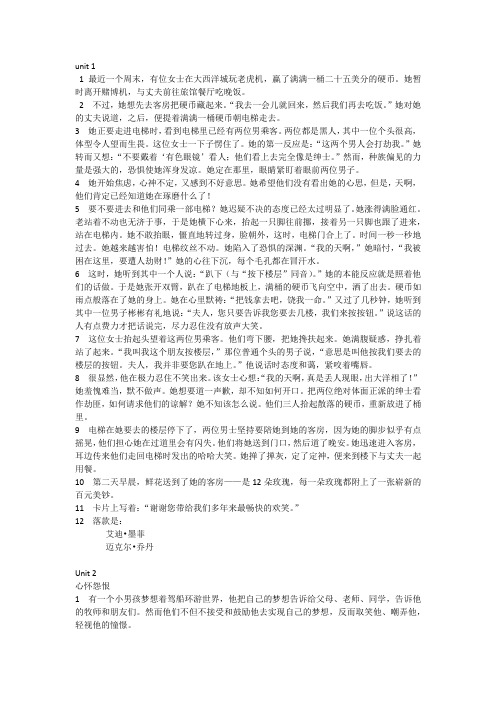
unit 11 最近一个周末,有位女士在大西洋城玩老虎机,赢了满满一桶二十五美分的硬币。
她暂时离开赌博机,与丈夫前往旅馆餐厅吃晚饭。
2 不过,她想先去客房把硬币藏起来。
“我去一会儿就回来,然后我们再去吃饭。
”她对她的丈夫说道,之后,便提着满满一桶硬币朝电梯走去。
3 她正要走进电梯时,看到电梯里已经有两位男乘客。
两位都是黑人,其中一位个头很高,体型令人望而生畏。
这位女士一下子愣住了。
她的第一反应是:“这两个男人会打劫我。
”她转而又想:“不要戴着‘有色眼镜’看人;他们看上去完全像是绅士。
”然而,种族偏见的力量是强大的,恐惧使她浑身发凉。
她定在那里,眼睛紧盯着眼前两位男子。
4 她开始焦虑,心神不定,又感到不好意思。
她希望他们没有看出她的心思,但是,天啊,他们肯定已经知道她在琢磨什么了!5 要不要进去和他们同乘一部电梯?她迟疑不决的态度已经太过明显了。
她涨得满脸通红。
老站着不动也无济于事,于是她横下心来,抬起一只脚往前挪,接着另一只脚也跟了进来,站在电梯内。
她不敢抬眼,僵直地转过身,脸朝外,这时,电梯门合上了。
时间一秒一秒地过去。
她越来越害怕!电梯纹丝不动。
她陷入了恐惧的深渊。
“我的天啊,”她暗忖,“我被困在这里,要遭人劫财!”她的心往下沉,每个毛孔都在冒汗水。
6 这时,她听到其中一个人说:“趴下(与“按下楼层”同音)。
”她的本能反应就是照着他们的话做。
于是她张开双臂,趴在了电梯地板上,满桶的硬币飞向空中,洒了出去。
硬币如雨点般落在了她的身上。
她在心里默祷:“把钱拿去吧,饶我一命。
”又过了几秒钟,她听到其中一位男子彬彬有礼地说:“夫人,您只要告诉我您要去几楼,我们来按按钮。
”说这话的人有点费力才把话说完,尽力忍住没有放声大笑。
7 这位女士抬起头望着这两位男乘客。
他们弯下腰,把她搀扶起来。
她满腹疑惑,挣扎着站了起来。
“我叫我这个朋友按楼层,”那位普通个头的男子说,“意思是叫他按我们要去的楼层的按钮。
夫人,我并非要您趴在地上。
全新大学英语综合教程课文原文及翻译

全新版大学英语综合教程课文原文及翻译————————————————————————————————作者:————————————————————————————————日期:Unit1One way of summarizing the American position is to state that we value originality and independence more than the Chinese do. The contrast between our two cultures can also be seen in terms of the fears we both harbor. Chinese teachers are fearful that if skills are not acquired early, they may never be acquired; there is, on the other hand, no comparable hurry to promote creativity. American educators fear that unless creativity has been acquired early, it may never emerge; on the other hand, skills can be picked up later.However, I do not want to overstate my case. There is enormous creativity to be found in Chinese scientific, technological and artistic innovations past and present. And there is a danger of exaggerating creative breakthroughs in the West. When any innovation is examined closely, its reliance on previous achievements is all too apparent (the "standing on the shoulders of giants" phenomenon).But assuming that the contrast I have developed is valid, and that the fostering of skills and creativity are both worthwhile goals, the important question becomes this: Can we gather, from the Chinese and American extremes, a superior way to approach education, perhaps striking a better balance between the poles of creativity and basic skills?Unit2Walton set up a college scholarship fund for employees' children, a disaster relief fund to rebuild employee homes damaged by fires, floods, tornadoes, and the like. He believed in cultivating ideas and rewarding success."He'd say, 'That fellow worked hard, let's give him a little extra,'" recalls retired president Ferold F. Arend, who was stunned at such generosity after the stingy employer he left to join Wal-Mart. "I had to change my way of thinking when I came aboard.""The reason for our success," says Walton, in a company handout, "is our people and the way they're treated and the way they feel about their company. They believe things are different here, but they deserve the credit."Adds company lawyer Jim Hendren: "I've never seen anyone yet who worked for him or was around him for any length of time who wasn't better off. And I don't mean just financially, although a lot of people are. It's just something about him -- coming into contact with Sam Walton just makes you a better person."Making the journey from log cabin to White House is part of the American Dream. But when Jimmy Carter was defeated in his attempt to gain a second term as President of the United States he found himself suddenly thrown out of the White House and back in his log cabin. This is how he coped.Unit3SEAN: If that sort of thing happened only once in a while, it wouldn't be so bad. Overall, I wouldn't want to trade my dad for anyone else's. He loves us kids and Mom too. But I think that's sometimes the problem. He wants to do things for us, things he thinks are good. But he needs to give them more thought because:SEAN, HEIDI and DIANE: (In unison) Father knows better!(The lights quickly fade to black and then come up a second or two later. DIANE stands alone at the Down Right edge of the stage. HEIDI and SEAN enter Down Left and cross to the edge of the stage. )DIANE: Can you imagine how humiliated I was? An honor student, class president. And Father was out asking people to have their sons call and ask me to the prom! But that's dear old dad. Actually, he is a dear. He just doesn't stop to think. And it's not just one of us who've felt the heavy hand of interference. Oh, no, all three of us live in constant dread knowing that at any time disaster can strike because: Father knows better.Unit4I'd never realized how important daily routine is: dressing for work, sleeping normal hours. I'd never thought I relied so much on co-workers for company. I began to understand why long-term unemployment can be so damaging, why life without an externally supported daily plan can lead to higher rates of drug abuse, crime, suicide.To restore balance to my life, I force myself back into the real world. I call people, arrange to meet with the few remaining friends who haven't fled New York City. I try to at least get to the gym, so as to set apart the weekend from the rest of my week. I arrange interviews for stories, doctor's appointments -- anything to get me out of the house and connected with others.But sometimes being face to face is too much. I see a friend and her ringing laughter is intolerable -- the noise of conversation in the restaurant, unbearable. I make my excuses and flee. I re-enter my apartment and run to the computer as though it were a place of safety.I click on the modem, the once-annoying sound of the connection now as pleasant as my favorite tune. I enter my password. The real world disappears.Thought you were safe sharing secrets with Internet friends? Wait for the doorbell...Unit5The runway felt different this time. It startled him for a brief moment. Then it all hit him like a wet bale of hay. The bar was set at nine inches higher than his personal best. That's only one inch off the National record, he thought. The intensity of the moment filled his mind with anxiety. He began shaking the tension. It wasn't working. He became more tense. Why was this happening to him now, he thought. He began to get nervous. Afraid would be a more accurate description. What was he going to do? He had never experienced these feelings. Then out of nowhere, and from the deepest depths of his soul, he pictured his mother. Why now? What was his mother doing in his thoughts at a time like this? It was simple. His mother always used to tell him when you felt tense, anxious or even scared, take deep breaths.So he did. Along with shaking the tension from his legs, he gently laid his pole at his feet. He began to stretch out his arms and upper body. The light breeze that was once there was now gone. He carefully picked up his pole. He felt his heart pounding. He was sure the crowd did, too. The silence was deafening. When he heard the singing of some distant birds in flight, he knew it was his time to fly.Unit6Racing the clock every day is such an exhausting effort that when I actually have a few free moments, I tend to collapse. Mostly I sink into a chair and stare into space while I imagine how lovely life would be if only I possessed the organizational skills and the energy of my superheroines. In fact, I waste a good deal of my spare time just worrying about what other women are accomplishing in theirs. Sometimes I think that these modern fairy tales create as many problems for women as the old stories that had us biding our time for the day our prince would come.Yet superwomen tales continue to charm me. Despite my friend's warning against being taken in, despite everything I've learned, I find that I'm not only willing, but positively eager to buy that bridge she mentioned. Why? I suppose it has something to do with the appeal of an optimistic approach to life -- and the fact that extraordinary deeds have been accomplished by determined individuals who refused to believe that "you can't" was the final word on their dreams.Men have generally been assured that achieving their heart's desires would be a piece of cake. Women, of course, have always believed that we can't have our cake and eat it too-the old low-dream diet. Perhaps becoming a superwoman is an impossible dream for me, but life without that kind of fantasy is as unappealing as a diet with no treats.1) The young woman described to the policemen the way the man ran up to her and grabbed the bag from her hand. 2) All the people working for Sam Walton admire the way he manages Wal-Mart and the way he treats his employees. 3) The neighbors were disgusted at the way he talked to his old father.4) It's amazing the way the eight-year-old boy managed to stay so calm when he faced the emergency.1. You will find yourself penniless in a month.2. He found himself lying in a hospital ward.3. She found herself faced with the toughest job she had ever taken.4. Susan found herself in a trap from which she could not escape.1) Obviously what the speaker wanted to emphasize was the impact of these findings rather than the process that led to these findings.2) It seems that he is never bothered about what people would think about his behavior.3) The CEO never hesitates to let his employees know what he is planning for the company.4) The scientist will show the audience what a tele-operated robot can do for a family.5)Despite all this she manages to get her act together.1、She herself believed in freedom,so much so that she would rather die than live without it.2、Assuming the proposal is accepted,where are we going to get the money?3、Only by rewarding success can you bring out the best in your employess.4、It’s amazing the eight-year-old boy managed to stay so calm when he faced the emergency.5、Allen should have known better than to lend such a large。
- 1、下载文档前请自行甄别文档内容的完整性,平台不提供额外的编辑、内容补充、找答案等附加服务。
- 2、"仅部分预览"的文档,不可在线预览部分如存在完整性等问题,可反馈申请退款(可完整预览的文档不适用该条件!)。
- 3、如文档侵犯您的权益,请联系客服反馈,我们会尽快为您处理(人工客服工作时间:9:00-18:30)。
全新版大学英语综合教程1 课文对照翻译BY12020212 Unit 1 Growing UPPart ⅡText A Writing for MyselfWhen we are writing we are often told to keep our readers in mind, to shape what we say to fit their tastes and interests. But there is one reader in particular who should not be forgotten. Can you guess who? Russell Baker surprised himself and everyone else when he discovered the answer.我们写作时常常被告诫,脑子里要有读者,笔者所云一定要符合读者的口味和兴趣。
但有一位读者特别不该忘记。
你能猜出是谁吗?当拉塞尔·贝克找到这个问题的答案时,他自己和别人都感到大为惊讶。
Writing for MyselfRussell Baker 1 The idea of becoming a writer had come to me off and on since my childhood in Belleville, but it wasn't until my third year in high school that the possibility took hold. Until then I've been boredby everything associated with English courses. I found English grammar dull and difficult. I hated the assignments to turn out long, lifeless paragraphs that were agony for teachers to read and for me to write.为自己而写拉塞尔·贝克从孩提时代,我还住在贝尔维尔时,我的脑子里就断断续续地转着当作家的念头,但直等到我高中三年级,这一想法才有了实现的可能。
在这之前,我对所有跟英文课沾边的事都感到腻味。
我觉得英文语法枯燥难懂。
我痛恨那些长而乏味的段落写作,老师读着受累,我写着痛苦。
2 When our class was assigned to Mr. Fleagle for third-year English I anticipated another cheerless year in that most tedious of subjects. Mr. Fleagle had a reputation among students for dullness and inability to inspire. He was said to be very formal, rigid and hopelessly out of date. To me he looked to be sixty or seventy and excessively prim. He wore primly severe eyeglasses, his wavy hair was primly cut and primly combed. He wore prim suits with neckties set primly against the collar buttons of his white shirts. He had a primly pointed jaw, a primly straight nose, and a prim manner of speaking that was so correct, so gentlemanly, that he seemed a comic antique.弗利格尔先生接我们的高三英文课时,我就准备着在这门最最单调乏味的课上再熬上沉闷的一年。
弗利格尔先生在学生中以其说话干巴和激励学生无术而出名。
据说他拘谨刻板,完全落后于时代。
我看他有六七十岁了,古板之极。
他戴着古板的毫无装饰的眼镜,微微卷曲的头发剪得笔齐,梳得纹丝不乱。
他身穿古板的套装,领带端端正正地顶着白衬衣的领扣。
他长着古板的尖下巴,古板的直鼻梁,说起话来一本正经,字斟句酌,彬彬有礼,活脱脱一个滑稽的老古董。
3 I prepared for an unfruitful year with Mr. Fleagle and for a long time was not disappointed. Late in the year we tackled the informal essay. Mr. Fleagle distributed a homework sheet offering us a choice of topics. None was quite so simple-minded as "What I Did on My Summer Vacation," but most seemed to be almost as dull. I took the list home and did nothing until the night before theessay was- 1due. Lying on the sofa, I finally faced up to the unwelcome task, took the list out of my notebook, and scanned it. The topic on which my eye stopped was "The Art of Eating Spaghetti."我作好准备,打算在弗利格尔先生的班上一无所获地混上一年,不少日子过去了,还真不出所料。
后半学期我们学写随笔小品文。
弗利格尔先生发下一张家庭作业纸,出了不少题目供我们选择。
像"暑假二三事"那样傻乎乎的题目倒是一个也没有,但绝大多数一样乏味。
我把作文题带回家,一直没写,直到要交作业的前一天晚上。
我躺在沙发上,最终不得不面对这一讨厌的功课,便从笔记本里抽出作文题目单粗粗一看。
我的目光落在"吃意大利细面条的艺术"这个题目上。
4 This title produced an extraordinary sequence of mental images. Vivid memories came flooding back of a night in Belleville when all of us were seated around the supper table ─ Uncle Allen, my mother, Uncle Charlie, Doris, Uncle Hal ─ and Aunt Pat served spaghetti for supper. Spaghetti was still a little known foreign dish in those days. Neither Doris nor I had ever eaten spaghetti, and none of the adults had enough experience to be good at it. All the good humor of Uncle Allen's house reawoke in my mind as I recalled the laughing arguments we had that night about the socially respectable method for moving spaghetti from plate to mouth.这个题目在我脑海里唤起了一连串不同寻常的图像。
贝尔维尔之夜的清晰的回忆如潮水一般涌来,当时,我们大家一起围坐在晚餐桌旁──艾伦舅舅、我母亲、查理舅舅、多丽丝、哈尔舅舅──帕特舅妈晚饭做的是意大利细面条。
那时意大利细面条还是很少听说的异国食品。
多丽丝和我都还从来没吃过,在座的大人也是经验不足,没有一个吃起来得心应手的。
艾伦舅舅家诙谐有趣的场景全都重现在我的脑海中,我回想起来,当晚我们笑作一团,争论着该如何地把面条从盘子上送到嘴里才算合乎礼仪。
5 Suddenly I wanted to write about that, about the warmth and good feeling of it, but I wanted to put it down simply for my own joy, not for Mr. Fleagle. It was a moment I wanted to recapture and hold for myself. I wanted to relive the pleasure of that evening. To write it as I wanted, however, would violate all the rules of formal composition I'd learned in school, and Mr. Fleagle would surely give it a failing grade. Never mind. I would write something else for Mr. Fleagle after I had written this thing for myself.突然我就想描述那一切,描述当时那种温馨美好的气氛,但我把它写下来仅仅是想自得其乐,而不是为弗利格尔先生而写。
那是我想重新捕捉并珍藏在心中的一个时刻。
我想重温那个夜晚的愉快。
然而,照我希望的那样去写,就会违反我在学校里学的正式作文的种种法则,弗利格尔先生也肯定会打它一个不及格。
没关系。
等我为自己写好了之后,我可以再为弗利格尔先生写点什么别的东西。
6 When I finished it the night was half gone and there was no time left to compose a proper, respectable essay for Mr. Fleagle. There was no choice next morning but to turn in my tale of the Belleville supper. Two days passed before Mr. Fleagle returned the graded papers, and hereturned everyone's but mine. I was preparing myself for a command to report to Mr. Fleagle immediately after school for discipline when I saw him lift my paper from his desk and knock forthe class's attention.等我写完时已是半夜时分,再没时间为弗利格尔先生写一篇循规蹈矩、像模像样的文章了。
